Abstract
BACKGROUND: Obesity is a major and increasing health problem in the United Kingdom, and, until recently, the government health promotion package for general practice reimbursed general practitioners for documenting obesity. Despite poor evidence for effectiveness of interventions in primary care, documentation of obesity could possibly improve patient awareness and knowledge, or provide public health information. AIM: To assess patient perception of obesity and its health risk, and the accuracy of estimating obesity using patient information. METHOD: Subjects were consecutive attenders to a general practitioner (GP) at a single urban practice in the South and West Region. Outcome measures were 'measured' body mass index (BMI) calculated from measured weight and height, 'estimated' BMI using patient information, and patient perception of obesity and the health risks of obesity. RESULTS: There is good correlation between 'estimated' and 'measured' BMI (intraclass correlation 0.91). Estimated BMI is lower than measured BMI (mean 0.77 lower), and the difference increases with age and level of BMI: for BMIs of < 20, 20-24.99, 25-29.99, and > or = 30 the mean differences (estimated-measured) were -0.06, -0.46, -0.98 and -1.72 respectively. Estimated obesity (BMI > 30) is reasonably sensitive (70%), specific (99%), and predictive (93% positive predictive value) of measured obesity (kappa 0.78). All obese subjects are aware that they are overweight, and most of them (78%, 95% confidence interval 66-88%) are aware that their weight is a health risk. CONCLUSION: Obese patients attending GPs' surgeries are likely to know if they are overweight, or could easily estimate from their knowledge of height and weight that they were overweight with reasonable accuracy. Obese subjects also know that their weight carries health risks. Thus, measurement of obesity in the general population is not likely to improve risk assessment or patient knowledge significantly. Without evidence for effective intervention or improved decision-making in primary care, reimbursement guidelines linked to the documentation of obesity in the population are probably an inefficient use of resources.
Full text
PDF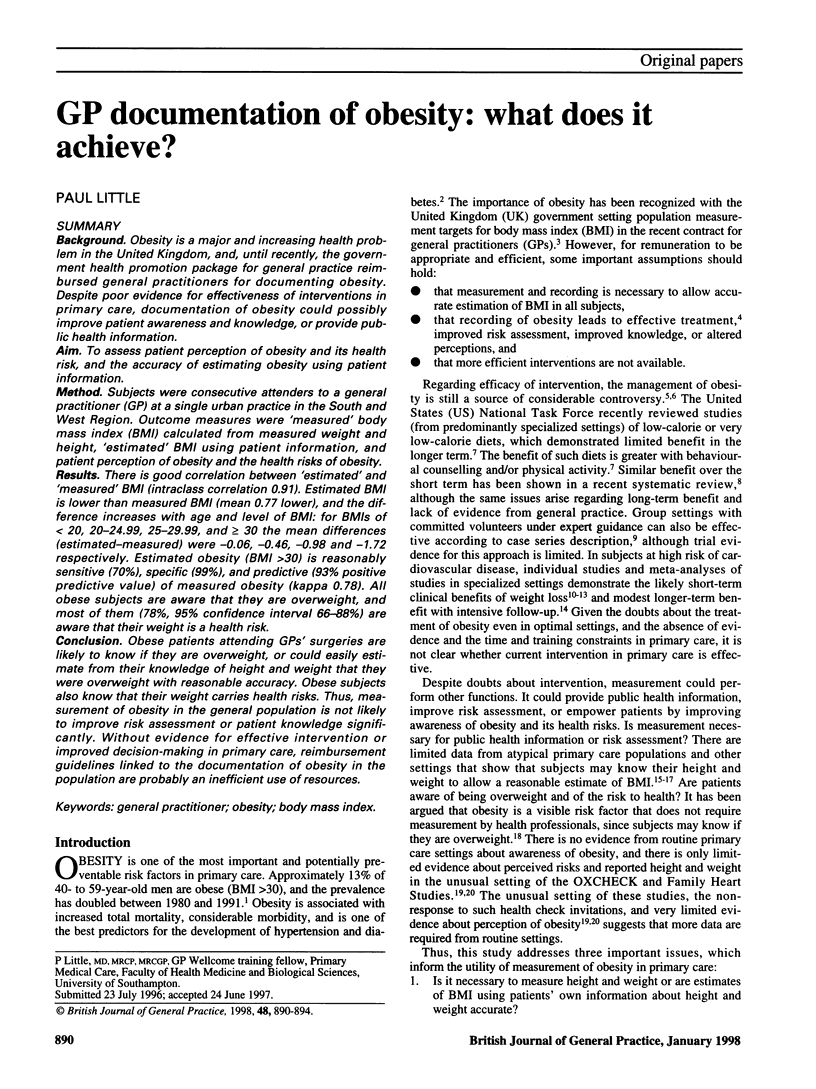
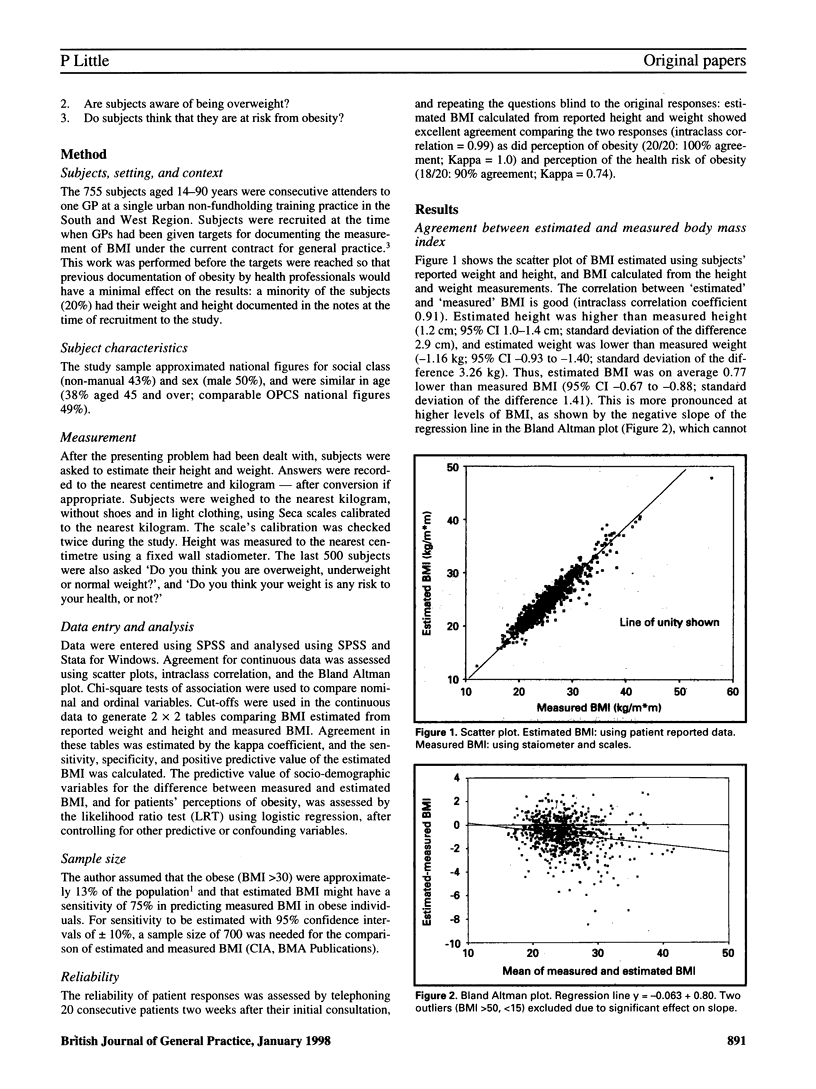
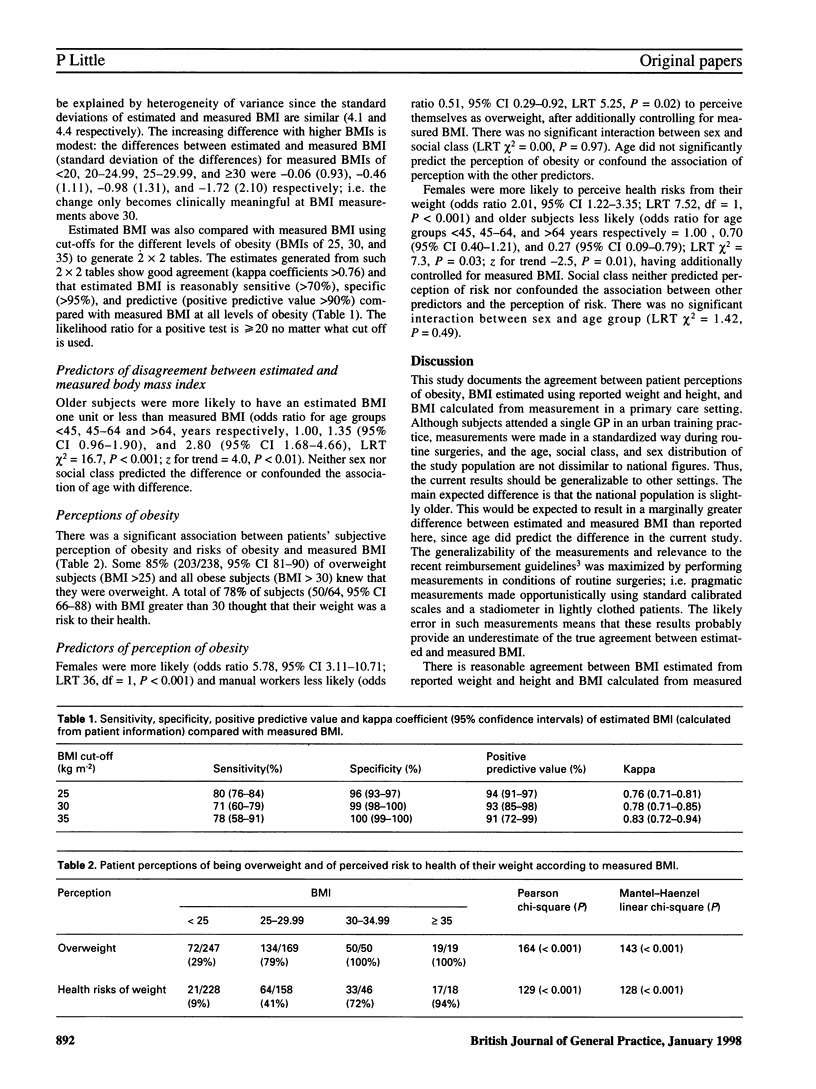
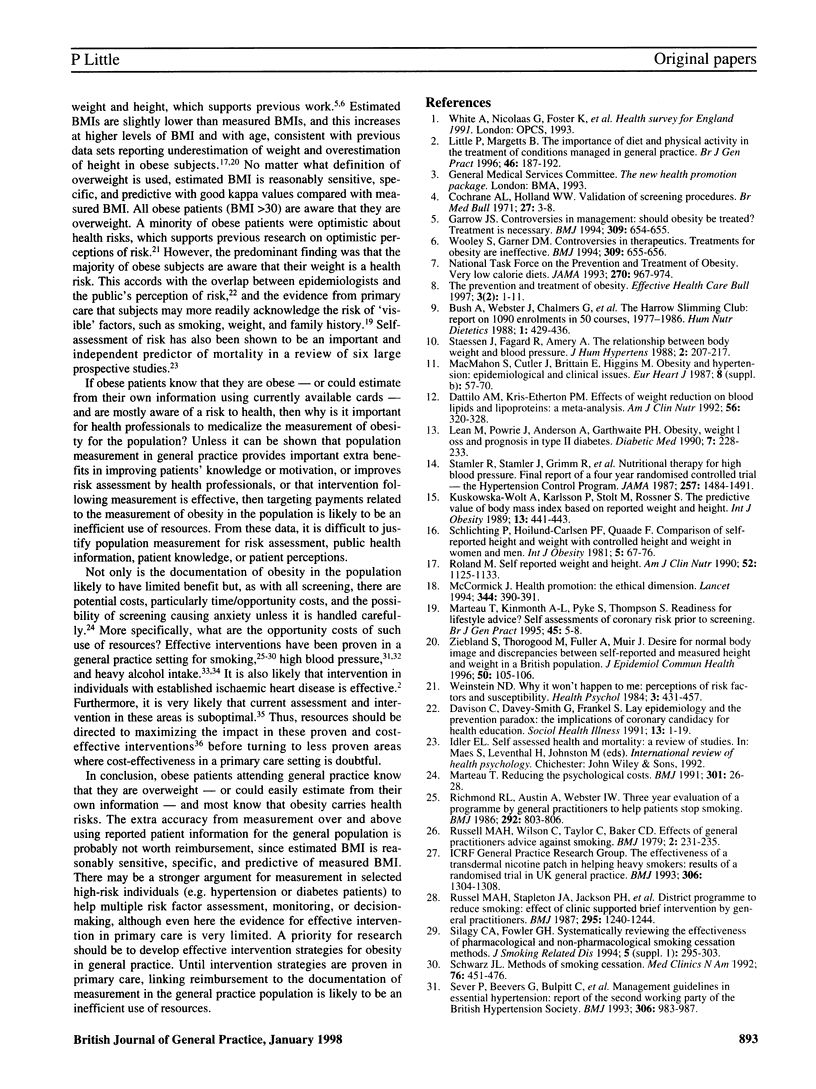
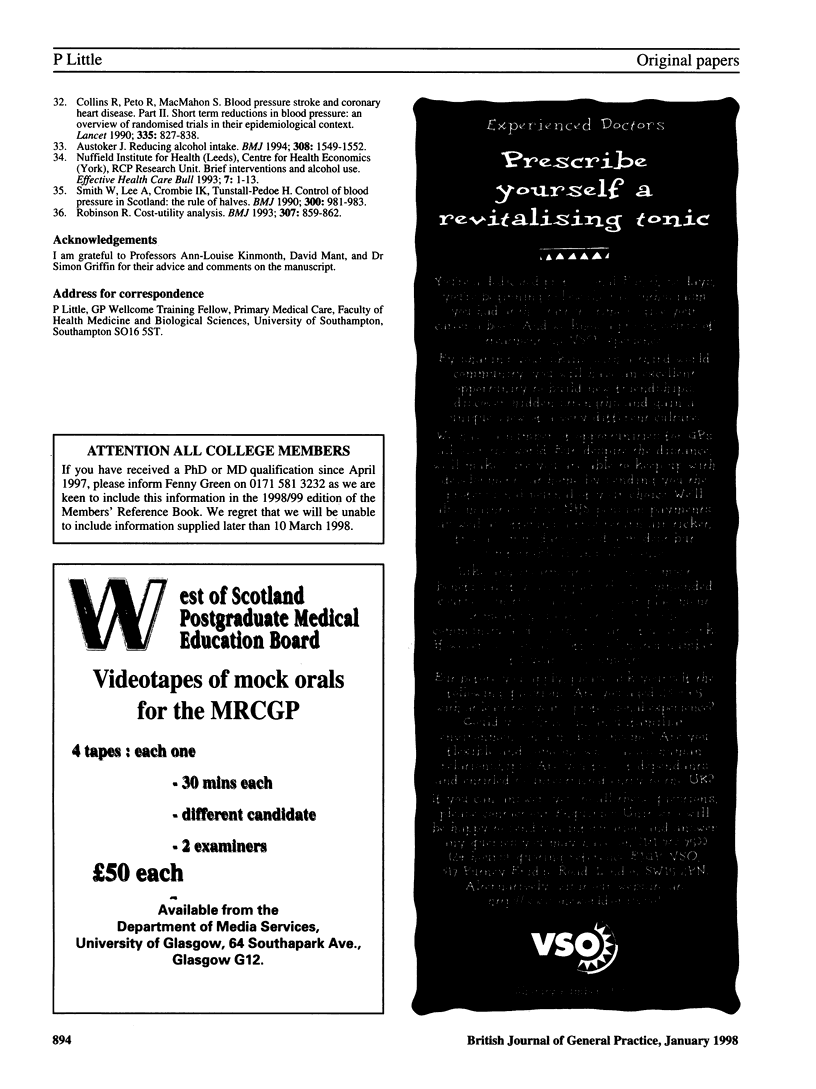
Selected References
These references are in PubMed. This may not be the complete list of references from this article.
- Austoker J. Reducing alcohol intake. BMJ. 1994 Jun 11;308(6943):1549–1552. doi: 10.1136/bmj.308.6943.1549. [DOI] [PMC free article] [PubMed] [Google Scholar]
- Cochrane A. L., Holland W. W. Validation of screening procedures. Br Med Bull. 1971 Jan;27(1):3–8. doi: 10.1093/oxfordjournals.bmb.a070810. [DOI] [PubMed] [Google Scholar]
- Collins R., Peto R., MacMahon S., Hebert P., Fiebach N. H., Eberlein K. A., Godwin J., Qizilbash N., Taylor J. O., Hennekens C. H. Blood pressure, stroke, and coronary heart disease. Part 2, Short-term reductions in blood pressure: overview of randomised drug trials in their epidemiological context. Lancet. 1990 Apr 7;335(8693):827–838. doi: 10.1016/0140-6736(90)90944-z. [DOI] [PubMed] [Google Scholar]
- Dattilo A. M., Kris-Etherton P. M. Effects of weight reduction on blood lipids and lipoproteins: a meta-analysis. Am J Clin Nutr. 1992 Aug;56(2):320–328. doi: 10.1093/ajcn/56.2.320. [DOI] [PubMed] [Google Scholar]
- Garrow J. S. Should obesity be treated? Treatment is necessary. BMJ. 1994 Sep 10;309(6955):654–655. doi: 10.1136/bmj.309.6955.654. [DOI] [PMC free article] [PubMed] [Google Scholar]
- Kuskowska-Wolk A., Karlsson P., Stolt M., Rössner S. The predictive validity of body mass index based on self-reported weight and height. Int J Obes. 1989;13(4):441–453. [PubMed] [Google Scholar]
- Lean M. E., Powrie J. K., Anderson A. S., Garthwaite P. H. Obesity, weight loss and prognosis in type 2 diabetes. Diabet Med. 1990 Mar-Apr;7(3):228–233. doi: 10.1111/j.1464-5491.1990.tb01375.x. [DOI] [PubMed] [Google Scholar]
- Little P., Margetts B. The importance of diet and physical activity in the treatment of conditions managed in general practice. Br J Gen Pract. 1996 Mar;46(404):187–192. [PMC free article] [PubMed] [Google Scholar]
- MacMahon S., Cutler J., Brittain E., Higgins M. Obesity and hypertension: epidemiological and clinical issues. Eur Heart J. 1987 May;8 (Suppl B):57–70. doi: 10.1093/eurheartj/8.suppl_b.57. [DOI] [PubMed] [Google Scholar]
- Marteau T. M., Kinmonth A. L., Pyke S., Thompson S. G. Readiness for lifestyle advice: self-assessments of coronary risk prior to screening in the British family heart study. Family Heart Study Group. Br J Gen Pract. 1995 Jan;45(390):5–8. [PMC free article] [PubMed] [Google Scholar]
- Marteau T. M. Screening in practice: Reducing the psychological costs. BMJ. 1990 Jul 7;301(6742):26–28. doi: 10.1136/bmj.301.6742.26. [DOI] [PMC free article] [PubMed] [Google Scholar]
- McCormick J. Health promotion: the ethical dimension. Lancet. 1994 Aug 6;344(8919):390–391. doi: 10.1016/s0140-6736(94)91407-9. [DOI] [PubMed] [Google Scholar]
- Richmond R. L., Austin A., Webster I. W. Three year evaluation of a programme by general practitioners to help patients to stop smoking. Br Med J (Clin Res Ed) 1986 Mar 22;292(6523):803–806. doi: 10.1136/bmj.292.6523.803. [DOI] [PMC free article] [PubMed] [Google Scholar]
- Robinson R. Cost-utility analysis. BMJ. 1993 Oct 2;307(6908):859–862. doi: 10.1136/bmj.307.6908.859. [DOI] [PMC free article] [PubMed] [Google Scholar]
- Rowland M. L. Self-reported weight and height. Am J Clin Nutr. 1990 Dec;52(6):1125–1133. doi: 10.1093/ajcn/52.6.1125. [DOI] [PubMed] [Google Scholar]
- Russell M. A., Stapleton J. A., Jackson P. H., Hajek P., Belcher M. District programme to reduce smoking: effect of clinic supported brief intervention by general practitioners. Br Med J (Clin Res Ed) 1987 Nov 14;295(6608):1240–1244. doi: 10.1136/bmj.295.6608.1240. [DOI] [PMC free article] [PubMed] [Google Scholar]
- Russell M. A., Wilson C., Taylor C., Baker C. D. Effect of general practitioners' advice against smoking. Br Med J. 1979 Jul 28;2(6184):231–235. doi: 10.1136/bmj.2.6184.231. [DOI] [PMC free article] [PubMed] [Google Scholar]
- Schlichting P., Høilund-Carlsen P. F., Quaade F. Comparison of self-reported height and weight with controlled height and weight in women and men. Int J Obes. 1981;5(1):67–76. [PubMed] [Google Scholar]
- Sever P., Beevers G., Bulpitt C., Lever A., Ramsay L., Reid J., Swales J. Management guidelines in essential hypertension: report of the second working party of the British Hypertension Society. BMJ. 1993 Apr 10;306(6883):983–987. doi: 10.1136/bmj.306.6883.983. [DOI] [PMC free article] [PubMed] [Google Scholar]
- Smith W. C., Lee A. J., Crombie I. K., Tunstall-Pedoe H. Control of blood pressure in Scotland: the rule of halves. BMJ. 1990 Apr 14;300(6730):981–983. doi: 10.1136/bmj.300.6730.981. [DOI] [PMC free article] [PubMed] [Google Scholar]
- Staessen J., Fagard R., Amery A. The relationship between body weight and blood pressure. J Hum Hypertens. 1988 Dec;2(4):207–217. [PubMed] [Google Scholar]
- Stamler R., Stamler J., Grimm R., Gosch F. C., Elmer P., Dyer A., Berman R., Fishman J., Van Heel N., Civinelli J. Nutritional therapy for high blood pressure. Final report of a four-year randomized controlled trial--the Hypertension Control Program. JAMA. 1987 Mar 20;257(11):1484–1491. doi: 10.1001/jama.257.11.1484. [DOI] [PubMed] [Google Scholar]
- Weinstein N. D. Why it won't happen to me: perceptions of risk factors and susceptibility. Health Psychol. 1984;3(5):431–457. doi: 10.1037//0278-6133.3.5.431. [DOI] [PubMed] [Google Scholar]
- Wooley S. C., Garner D. M. Dietary treatments for obesity are ineffective. BMJ. 1994 Sep 10;309(6955):655–656. doi: 10.1136/bmj.309.6955.655. [DOI] [PMC free article] [PubMed] [Google Scholar]
- Ziebland S., Thorogood M., Fuller A., Muir J. Desire for the body normal: body image and discrepancies between self reported and measured height and weight in a British population. J Epidemiol Community Health. 1996 Feb;50(1):105–106. doi: 10.1136/jech.50.1.105. [DOI] [PMC free article] [PubMed] [Google Scholar]


